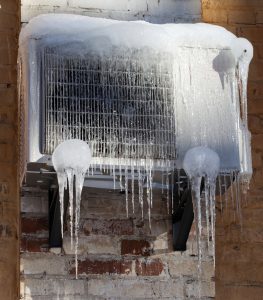 There is a short answer and a long answer to that question. The short answer is that airflow has become restricted somehow in the interior of the air conditioner, which has cooled the temperature to freezing degrees. The long answer? Well, a combination of airflow being restricted and increased moisture can both be the culprits of ice forming on an air conditioner. Either way, this is a problem with air conditioning in Scarsdale, NY that needs to be addressed as soon as it’s found. And no, by addressing it we don’t mean using a hairdryer to melt the ice periodically.
There is a short answer and a long answer to that question. The short answer is that airflow has become restricted somehow in the interior of the air conditioner, which has cooled the temperature to freezing degrees. The long answer? Well, a combination of airflow being restricted and increased moisture can both be the culprits of ice forming on an air conditioner. Either way, this is a problem with air conditioning in Scarsdale, NY that needs to be addressed as soon as it’s found. And no, by addressing it we don’t mean using a hairdryer to melt the ice periodically.
For a system that’s concerned with bringing air into a home, airflow is of vital importance to an air conditioner. Without proper airflow maintenance, cleaned filters, and cleaned coils, the system will get air trapped inside of it that steadily drops in temperature. Eventually, a house might be 80°F but the inside of the air conditioner will quickly be approaching 20°F!
So, let’s talk about what can be done to avoid ice, and more specifically how airflow gets blocked in the first place.
How Does Airflow Get Restricted?
Homeowners often think that the air filter inside their air conditioner is for their indoor air quality, but that’s absolutely not the case. Air filters are to protect the more sensitive interior parts of the system from dust and debris while it cycles through the air. However, when these air filters get clogged up with said dirt and debris, they force the air conditioner to work much harder than it normally should to pull air in from the outside. The airflow could get so restricted from the filter that it becomes trapped in certain parts of the AC system while the temperature slowly drops below freezing.
If refrigerant begins to leak from the system, or there’s no refrigerant left, the pressure in the AC’s evaporator coil can drop and cause moisture in the air to accumulate on the coil. Take the moisture on the coil and add in the frigid temperature from the airflow blockage, and that’s a perfect recipe for ice buildup.
How to Avoid a Frozen AC
Maintenance, maintenance, maintenance! These problems really only come from neglect, since there are multiple clues that can key in a service professional that airflow is being blocked or refrigerant is leaking. An AC check-up every year can at least stop an AC problem like this from being a surprise when it does happen. Also, technicians clean filters, ducts, and coils when performing maintenance which can also make it harder for a system to freeze up.
If an AC is constantly freezing, leaking, and having airflow problems, it might be worth looking into a replacement. These problems can be expensive and reoccurring without proper maintenance. A good rule of thumb to remember is if the total repair cost for an AC unit is more than half the cost of a brand-new replacement, it might be more cost-efficient to purchase a longer-lasting replacement system. Ultimately, the choice belongs to the customer.
Dealing with an AC that’s freezing up? Contact Yost & Campbell Heating, Cooling & Generators today!

